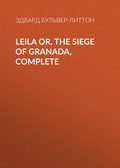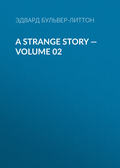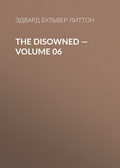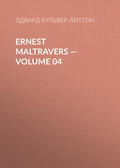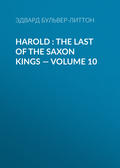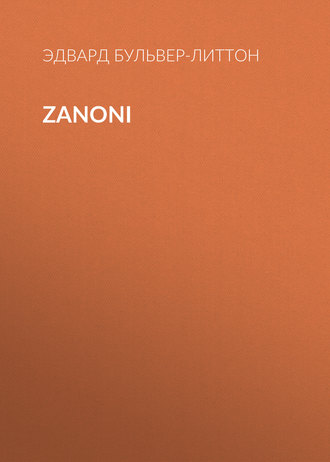
Эдвард Бульвер-Литтон
Zanoni
CHAPTER 4.X
Aeterna aeternus tribuit, mortalia confert
Mortalis; divina Deus, peritura caducus.
“Aurel. Prud. contra Symmachum,” lib. ii.
(The Eternal gives eternal things, the Mortal gathers mortal things: God, that which is divine, and the perishable that which is perishable.)
EXTRACTS FROM THE LETTERS OF ZANONI TO MEJNOUR.
Letter 1.
Thou hast not informed me of the progress of thy pupil; and I fear that so differently does circumstance shape the minds of the generations to which we are descended, from the intense and earnest children of the earlier world, that even thy most careful and elaborate guidance would fail, with loftier and purer natures than that of the neophyte thou hast admitted within thy gates. Even that third state of being, which the Indian sage (The Brahmins, speaking of Brahm, say, “To the Omniscient the three modes of being—sleep, waking, and trance—are not;” distinctly recognising trance as a third and coequal condition of being.) rightly recognises as being between the sleep and the waking, and describes imperfectly by the name of TRANCE, is unknown to the children of the Northern world; and few but would recoil to indulge it, regarding its peopled calm as maya and delusion of the mind. Instead of ripening and culturing that airy soil, from which Nature, duly known, can evoke fruits so rich and flowers so fair, they strive but to exclude it from their gaze; they esteem that struggle of the intellect from men’s narrow world to the spirit’s infinite home, as a disease which the leech must extirpate with pharmacy and drugs, and know not even that it is from this condition of their being, in its most imperfect and infant form, that poetry, music, art—all that belong to an Idea of Beauty to which neither SLEEPING nor WAKING can furnish archetype and actual semblance—take their immortal birth. When we, O Mejnour in the far time, were ourselves the neophytes and aspirants, we were of a class to which the actual world was shut and barred. Our forefathers had no object in life but knowledge. From the cradle we were predestined and reared to wisdom as to a priesthood. We commenced research where modern Conjecture closes its faithless wings. And with us, those were common elements of science which the sages of to-day disdain as wild chimeras, or despair of as unfathomable mysteries. Even the fundamental principles, the large yet simple theories of electricity and magnetism, rest obscure and dim in the disputes of their blinded schools; yet, even in our youth, how few ever attained to the first circle of the brotherhood, and, after wearily enjoying the sublime privileges they sought, they voluntarily abandoned the light of the sun, and sunk, without effort, to the grave, like pilgrims in a trackless desert, overawed by the stillness of their solitude, and appalled by the absence of a goal. Thou, in whom nothing seems to live BUT THE DESIRE TO KNOW; thou, who, indifferent whether it leads to weal or to woe, lendest thyself to all who would tread the path of mysterious science, a human book, insensate to the precepts it enounces,—thou hast ever sought, and often made additions to our number. But to these have only been vouchsafed partial secrets; vanity and passion unfitted them for the rest; and now, without other interest than that of an experiment in science, without love, and without pity, thou exposest this new soul to the hazards of the tremendous ordeal! Thou thinkest that a zeal so inquisitive, a courage so absolute and dauntless, may suffice to conquer, where austerer intellect and purer virtue have so often failed. Thou thinkest, too, that the germ of art that lies in the painter’s mind, as it comprehends in itself the entire embryo of power and beauty, may be expanded into the stately flower of the Golden Science. It is a new experiment to thee. Be gentle with thy neophyte, and if his nature disappoint thee in the first stages of the process, dismiss him back to the Real while it is yet time to enjoy the brief and outward life which dwells in the senses, and closes with the tomb. And as I thus admonish thee, O Mejnour, wilt thou smile at my inconsistent hopes? I, who have so invariably refused to initiate others into our mysteries,—I begin at last to comprehend why the great law, which binds man to his kind, even when seeking most to set himself aloof from their condition, has made thy cold and bloodless science the link between thyself and thy race; why, THOU has sought converts and pupils; why, in seeing life after life voluntarily dropping from our starry order, thou still aspirest to renew the vanished, and repair the lost; why, amidst thy calculations, restless and unceasing as the wheels of Nature herself, thou recoilest from the THOUGHT TO BE ALONE! So with myself; at last I, too, seek a convert, an equal,—I, too, shudder to be alone! What thou hast warned me of has come to pass. Love reduces all things to itself. Either must I be drawn down to the nature of the beloved, or hers must be lifted to my own. As whatever belongs to true Art has always necessarily had attraction for US, whose very being is in the ideal whence Art descends, so in this fair creature I have learned, at last, the secret that bound me to her at the first glance. The daughter of music,—music, passing into her being, became poetry. It was not the stage that attracted her, with its hollow falsehoods; it was the land in her own fancy which the stage seemed to centre and represent. There the poetry found a voice,—there it struggled into imperfect shape; and then (that land insufficient for it) it fell back upon itself. It coloured her thoughts, it suffused her soul; it asked not words, it created not things; it gave birth but to emotions, and lavished itself on dreams. At last came love; and there, as a river into the sea, it poured its restless waves, to become mute and deep and still,—the everlasting mirror of the heavens.
And is it not through this poetry which lies within her that she may be led into the large poetry of the universe! Often I listen to her careless talk, and find oracles in its unconscious beauty, as we find strange virtues in some lonely flower. I see her mind ripening under my eyes; and in its fair fertility what ever-teeming novelties of thought! O Mejnour! how many of our tribe have unravelled the laws of the universe,—have solved the riddles of the exterior nature, and deduced the light from darkness! And is not the POET, who studies nothing but the human heart, a greater philosopher than all? Knowledge and atheism are incompatible. To know Nature is to know that there must be a God. But does it require this to examine the method and architecture of creation? Methinks, when I look upon a pure mind, however ignorant and childlike, that I see the August and Immaterial One more clearly than in all the orbs of matter which career at His bidding through space.
Rightly is it the fundamental decree of our order, that we must impart our secrets only to the pure. The most terrible part of the ordeal is in the temptations that our power affords to the criminal. If it were possible that a malevolent being could attain to our faculties, what disorder it might introduce into the globe! Happy that it is NOT possible; the malevolence would disarm the power. It is in the purity of Viola that I rely, as thou more vainly hast relied on the courage or the genius of thy pupils. Bear me witness, Mejnour! Never since the distant day in which I pierced the Arcana of our knowledge, have I ever sought to make its mysteries subservient to unworthy objects; though, alas! the extension of our existence robs us of a country and a home; though the law that places all science, as all art, in the abstraction from the noisy passions and turbulent ambition of actual life, forbids us to influence the destinies of nations, for which Heaven selects ruder and blinder agencies; yet, wherever have been my wanderings, I have sought to soften distress, and to convert from sin. My power has been hostile only to the guilty; and yet with all our lore, how in each step we are reduced to be but the permitted instruments of the Power that vouchsafes our own, but only to direct it. How all our wisdom shrinks into nought, compared with that which gives the meanest herb its virtues, and peoples the smallest globule with its appropriate world. And while we are allowed at times to influence the happiness of others, how mysteriously the shadows thicken round our own future doom! We cannot be prophets to ourselves! With what trembling hope I nurse the thought that I may preserve to my solitude the light of a living smile!
....
Extracts from Letter II.
Deeming myself not pure enough to initiate so pure a heart, I invoke to her trance those fairest and most tender inhabitants of space that have furnished to poetry, which is the instinctive guess into creation, the ideas of the Glendoveer and Sylph. And these were less pure than her own thoughts, and less tender than her own love! They could not raise her above her human heart, for THAT has a heaven of its own.
....
I have just looked on her in sleep,—I have heard her breathe my name. Alas! that which is so sweet to others has its bitterness to me; for I think how soon the time may come when that sleep will be without a dream,—when the heart that dictates the name will be cold, and the lips that utter it be dumb. What a twofold shape there is in love! If we examine it coarsely,—if we look but on its fleshy ties, its enjoyments of a moment, its turbulent fever and its dull reaction,—how strange it seems that this passion should be the supreme mover of the world; that it is this which has dictated the greatest sacrifices, and influenced all societies and all times; that to this the loftiest and loveliest genius has ever consecrated its devotion; that, but for love, there were no civilisation, no music, no poetry, no beauty, no life beyond the brute’s.
But examine it in its heavenlier shape,—in its utter abnegation of self; in its intimate connection with all that is most delicate and subtle in the spirit,—its power above all that is sordid in existence; its mastery over the idols of the baser worship; its ability to create a palace of the cottage, an oasis in the desert, a summer in the Iceland,—where it breathes, and fertilises, and glows; and the wonder rather becomes how so few regard it in its holiest nature. What the sensual call its enjoyments, are the least of its joys. True love is less a passion than a symbol. Mejnour, shall the time come when I can speak to thee of Viola as a thing that was?
....
Extract from Letter III.
Knowest thou that of late I have sometimes asked myself, “Is there no guilt in the knowledge that has so divided us from our race?” It is true that the higher we ascend the more hateful seem to us the vices of the short-lived creepers of the earth,—the more the sense of the goodness of the All-good penetrates and suffuses us, and the more immediately does our happiness seem to emanate from him. But, on the other hand, how many virtues must lie dead in those who live in the world of death, and refuse to die! Is not this sublime egotism, this state of abstraction and reverie,—this self-wrapped and self-dependent majesty of existence, a resignation of that nobility which incorporates our own welfare, our joys, our hopes, our fears with others? To live on in no dread of foes, undegraded by infirmity, secure through the cares, and free from the disease of flesh, is a spectacle that captivates our pride. And yet dost thou not more admire him who dies for another? Since I have loved her, Mejnour, it seems almost cowardice to elude the grave which devours the hearts that wrap us in their folds. I feel it,—the earth grows upon my spirit. Thou wert right; eternal age, serene and passionless, is a happier boon than eternal youth, with its yearnings and desires. Until we can be all spirit, the tranquillity of solitude must be indifference.
....
Extracts from Letter IV.
I have received thy communication. What! is it so? Has thy pupil disappointed thee? Alas, poor pupil! But—
....
(Here follow comments on those passages in Glyndon’s life already known to the reader, or about to be made so, with earnest adjurations to Mejnour to watch yet over the fate of his scholar.)
....
But I cherish the same desire, with a warmer heart. My pupil! how the terrors that shall encompass thine ordeal warn me from the task! Once more I will seek the Son of Light.
....
Yes; Adon-Ai, long deaf to my call, at last has descended to my vision, and left behind him the glory of his presence in the shape of Hope. Oh, not impossible, Viola,—not impossible, that we yet may be united, soul with soul!
Extract from Letter V.—(Many months after the last.)
Mejnour, awake from thine apathy,—rejoice! A new soul will be born to the world,—a new soul that shall call me father. Ah, if they for whom exist all the occupations and resources of human life,—if they can thrill with exquisite emotion at the thought of hailing again their own childhood in the faces of their children; if in that birth they are born once more into the holy Innocence which is the first state of existence; if they can feel that on man devolves almost an angel’s duty, when he has a life to guide from the cradle, and a soul to nurture for the heaven,—what to me must be the rapture to welcome an inheritor of all the gifts which double themselves in being shared! How sweet the power to watch, and to guard,—to instil the knowledge, to avert the evil, and to guide back the river of life in a richer and broader and deeper stream to the paradise from which it flows! And beside that river our souls shall meet, sweet mother. Our child shall supply the sympathy that fails as yet; and what shape shall haunt thee, what terror shall dismay, when thy initiation is beside the cradle of thy child!
CHAPTER 4.XI
They thus beguile the way
Untill the blustring storme is overblowne,
When weening to returne whence they did stray,
They cannot finde that path which first was showne,
But wander to and fro in waies unknowne.
—Spenser’s “Faerie Queene,” book i. canto i. st. x.
Yes, Viola, thou art another being than when, by the threshold of thy Italian home, thou didst follow thy dim fancies through the Land of Shadow; or when thou didst vainly seek to give voice to an ideal beauty, on the boards where illusion counterfeits earth and heaven for an hour, till the weary sense, awaking, sees but the tinsel and the scene-shifter. Thy spirit reposes in its own happiness. Its wanderings have found a goal. In a moment there often dwells the sense of eternity; for when profoundly happy, we know that it is impossible to die. Whenever the soul FEELS ITSELF, it feels everlasting life.
The initiation is deferred,—thy days and nights are left to no other visions than those with which a contented heart enchants a guileless fancy. Glendoveers and Sylphs, pardon me if I question whether those visions are not lovelier than yourselves.
They stand by the beach, and see the sun sinking into the sea. How long now have they dwelt on that island? What matters!—it may be months, or years—what matters! Why should I, or they, keep account of that happy time? As in the dream of a moment ages may seem to pass, so shall we measure transport or woe,—by the length of the dream, or the number of emotions that the dream involves?
The sun sinks slowly down; the air is arid and oppressive; on the sea, the stately vessel lies motionless; on the shore, no leaf trembles on the trees.
Viola drew nearer to Zanoni. A presentiment she could not define made her heart beat more quickly; and, looking into his face, she was struck with its expression: it was anxious, abstracted, perturbed. “This stillness awes me,” she whispered.
Zanoni did not seem to hear her. He muttered to himself, and his eyes gazed round restlessly. She knew not why, but that gaze, which seemed to pierce into space,—that muttered voice in some foreign language—revived dimly her earlier superstitions. She was more fearful since the hour when she knew that she was to be a mother. Strange crisis in the life of woman, and in her love! Something yet unborn begins already to divide her heart with that which had been before its only monarch.
“Look on me, Zanoni,” she said, pressing his hand.
He turned: “Thou art pale, Viola; thy hand trembles!”
“It is true. I feel as if some enemy were creeping near us.”
“And the instinct deceives thee not. An enemy is indeed at hand. I see it through the heavy air; I hear it through the silence: the Ghostly One,—the Destroyer, the PESTILENCE! Ah, seest thou how the leaves swarm with insects, only by an effort visible to the eye. They follow the breath of the plague!” As he spoke, a bird fell from the boughs at Viola’s feet; it fluttered, it writhed an instant, and was dead.
“Oh, Viola!” cried Zanoni, passionately, “that is death. Dost thou not fear to die?”
“To leave thee? Ah, yes!”
“And if I could teach thee how Death may be defied; if I could arrest for thy youth the course of time; if I could—”
He paused abruptly, for Viola’s eyes spoke only terror; her cheek and lips were pale.
“Speak not thus,—look not thus,” she said, recoiling from him. “You dismay me. Ah, speak not thus, or I should tremble,—no, not for myself, but for thy child.”
“Thy child! But wouldst thou reject for thy child the same glorious boon?”
“Zanoni!”
“Well!”
“The sun has sunk from our eyes, but to rise on those of others. To disappear from this world is to live in the world afar. Oh, lover,—oh, husband!” she continued, with sudden energy, “tell me that thou didst but jest,—that thou didst but trifle with my folly! There is less terror in the pestilence than in thy words.”
Zanoni’s brow darkened; he looked at her in silence for some moments, and then said, almost severely,—
“What hast thou known of me to distrust?”
“Oh, pardon, pardon!—nothing!” cried Viola, throwing herself on his breast, and bursting into tears. “I will not believe even thine own words, if they seem to wrong thee!” He kissed the tears from her eyes, but made no answer.
“And ah!” she resumed, with an enchanting and child-like smile, “if thou wouldst give me a charm against the pestilence! see, I will take it from thee.” And she laid her hand on a small, antique amulet that he wore on his breast.
“Thou knowest how often this has made me jealous of the past; surely some love-gift, Zanoni? But no, thou didst not love the giver as thou dost me. Shall I steal thine amulet?”
“Infant!” said Zanoni, tenderly; “she who placed this round my neck deemed it indeed a charm, for she had superstitions like thyself; but to me it is more than the wizard’s spell,—it is the relic of a sweet vanished time when none who loved me could distrust.”
He said these words in a tone of such melancholy reproach that it went to the heart of Viola; but the tone changed into a solemnity which chilled back the gush of her feelings as he resumed: “And this, Viola, one day, perhaps, I will transfer from my breast to thine; yes, whenever thou shalt comprehend me better,—WHENEVER THE LAWS OF OUR BEING SHALL BE THE SAME!”
He moved on gently. They returned slowly home; but fear still was in the heart of Viola, though she strove to shake it off. Italian and Catholic she was, with all the superstitions of land and sect. She stole to her chamber and prayed before a little relic of San Gennaro, which the priest of her house had given to her in childhood, and which had accompanied her in all her wanderings. She had never deemed it possible to part with it before. Now, if there was a charm against the pestilence, did she fear the pestilence for herself? The next morning, when he awoke, Zanoni found the relic of the saint suspended with his mystic amulet round his neck.
“Ah! thou wilt have nothing to fear from the pestilence now,” said Viola, between tears and smiles; “and when thou wouldst talk to me again as thou didst last night, the saint shall rebuke thee.”
Well, Zanoni, can there ever indeed be commune of thought and spirit, except with equals?
Yes, the plague broke out,—the island home must be abandoned. Mighty Seer, THOU HAST NO POWER TO SAVE THOSE WHOM THOU LOVEST! Farewell, thou bridal roof!—sweet resting-place from care, farewell! Climates as soft may greet ye, O lovers,—skies as serene, and waters as blue and calm; but THAT TIME,—can it ever more return? Who shall say that the heart does not change with the scene,—the place where we first dwelt with the beloved one? Every spot THERE has so many memories which the place only can recall. The past that haunts it seems to command such constancy in the future. If a thought less kind, less trustful, enter within us, the sight of a tree under which a vow has been exchanged, a tear has been kissed away, restores us again to the hours of the first divine illusion. But in a home where nothing speaks of the first nuptials, where there is no eloquence of association, no holy burial-places of emotions, whose ghosts are angels!—yes, who that has gone through the sad history of affection will tell us that the heart changes not with the scene! Blow fair, ye favouring winds; cheerily swell, ye sails; away from the land where death has come to snatch the sceptre of Love! The shores glide by; new coasts succeed to the green hills and orange-groves of the Bridal Isle. From afar now gleam in the moonlight the columns, yet extant, of a temple which the Athenian dedicated to wisdom; and, standing on the bark that bounded on in the freshening gale, the votary who had survived the goddess murmured to himself,—
“Has the wisdom of ages brought me no happier hours than those common to the shepherd and the herdsman, with no world beyond their village, no aspiration beyond the kiss and the smile of home?”
And the moon, resting alike over the ruins of the temple of the departed creed, over the hut of the living peasant, over the immemorial mountain-top, and the perishable herbage that clothed its sides, seemed to smile back its answer of calm disdain to the being who, perchance, might have seen the temple built, and who, in his inscrutable existence, might behold the mountain shattered from its base.



